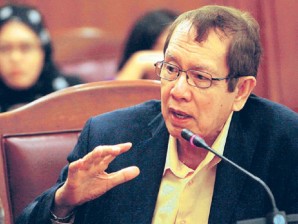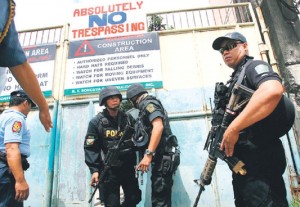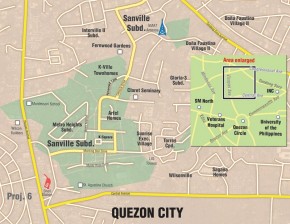Nightmare on Visayas Avenue
 Something has gone terribly wrong with the land registration system we copied from the models of a South Australian bureaucrat named Sir Robert Torrens. Now referred to as Torrens title, the certificate of land ownership issued by the government through its sovereign agency (now called the Land Registration Authority [LRA]) is supposed to be accorded the highest respect and authority when it comes to land disputes.
Something has gone terribly wrong with the land registration system we copied from the models of a South Australian bureaucrat named Sir Robert Torrens. Now referred to as Torrens title, the certificate of land ownership issued by the government through its sovereign agency (now called the Land Registration Authority [LRA]) is supposed to be accorded the highest respect and authority when it comes to land disputes.
The system was meant to provide “conclusive evidence of land ownership” and “relieve such ownership from the uncertainty of unknown liens or encumbrances.” In other words, land titleholders under the Torrens system were assured that they could sleep easy and trust the government to keep such certificates wholly trustworthy, worry-free and totally safe from the machinations of land-grabbers.
Sleeping on job
But if the LRA is sleeping on the job, the nightmare begins. The 24-hectare premium real estate in Quezon City being claimed by Wilfredo Torres is a case in point. Torres said he derived his ownership of the property from ancient documents dating back to the era when grants or titles over expansive tracts of our lands were being churned out and distributed by the Spanish Crown to favored subjects.
Through the decades, this vast real estate had been parceled out, transferred and acquired by individuals who had no knowledge of its history and thus merely relied on what appeared on the Torrens title.
Innocent purchasers
They had every right to do so. One eximious principle governing lands covered by the Torrens system is that third parties who have no knowledge whatsoever of any defect, lien or encumbrance not annotated on the title are deemed “innocent purchasers for value” and their title indefeasible (perfectly legal and unassailable) against all unknown claims.
The law does not require them to look beyond the annotations on the title.
As the controversy unravels, it now appears that the LRA had long been aware of the “spurious” nature of the Spanish titles in question and the other proofs of ownership derived from them through the years, but had done practically nothing to shred those bogus titles to pieces and consign them to oblivion for what they really are: scraps of paper.

Voided Spanish titles
It may be apropos to note that a Marcos decree had voided such Spanish titles unless they were brought before the courts for judicial confirmation within the time prescribed. That time had long lapsed. At any rate, with the LRA’s Johnny-come-lately protestations that those titles were “spurious,” there was no way the court could have ignored that fact had that agency, after all mandatory notices to it, intervened promptly and more assiduously.
How Torres was able to get fast and favorable decrees/judgments from the court so swimmingly is truly one for Ripley’s! The register of deeds of Quezon City, under pain of contempt (as in fact he was sent to jail by the court when he first balked at complying on suspicion that they were highly irregular), had no choice but to issue the titles in Torres’ favor as ordered by the court.
As a consequence, Torres is now armed with his own “genuine” (because court-mandated) Torrens titles and a formidable writ of possession, to boot, empowering the court sheriff to put him in possession of the whole real estate in question.
Thus, homeowners in so many gated subdivisions and businessmen in so many commercial and industrial establishments in Quezon City, not to mention the owners of condominium units and townhouses in that neck of the woods (See map) are now being seriously threatened with dispossession and eviction—despite incontrovertible Torrens titles in their own names!

Unkindest cut
And here is the unkindest cut: Even if the individual titleholders could file cases in court to establish the genuineness of their own Torrens titles as against the supposedly counterfeit titles of Torres, the docket and filing fees alone would run in the hundreds of millions of pesos given the mind-boggling size and the current market value of the property involved.
It may be apt to note that at the time Torres filed his own cases to recover the real estate, he might have been able to avail himself of the rule that required him to pay only minimal docket and filing fees because his complaints were then deemed “incapable of pecuniary estimation,” and therefore exempt from being slapped such fees on the basis of the value of the property he was claiming.
Regrettably, that praxis is no longer tenable under the new-fangled amendments to Rule 141 of the Rules of Court. By whatever guise a complaint may be filed (such as for annulment of contract or foreclosure of mortgage) recent Supreme Court decisions hold that since the ultimate prayer is for recovery of property, the plaintiff must pay the judicial fees based on the current market value of the property in litigation or the Bureau of Internal Revenue’s zonal valuation thereof, whichever is higher, plus all amounts claimed as damages and attorney’s fees.
Even as our Constitution says, “no one shall be denied access to the courts by reason of poverty” and therefore, arguably, the embattled individual titleholders should breeze through the court’s docket sections in filing cases to stop Torres and his goons dead in their tracks, in reality, that is not going to happen.
Thus, assuming that the aggregate value of the real estate involved amounts to P100 billion (conservatively), at the going rate of P18,000 plus per P1 million… well, anyone can do the math here! Sad to say, indeed, the extremely high cost of seeking judicial redress of grievances in such instances may lead the less-moneyed among us to take the law into their own hands (which is actually happening already with affected homeowners barricading their premises in defiance of court orders!).
Corporate land-grabber
A few weeks ago, we wrote in the Inquirer a commentary about the brothers who were robbed of their inheritance by a corporate land-grabber. When they tried to sue the corporation to recover the property, they got the shock of their lives: they were required to pay P1.5 million in judicial fees based on the P80-million market value of the property stolen!
Unable to pay the cost of seeking judicial redress of their grievance, the brothers could only suffer in silence. Who says crime does not pay?

Sheriff duty-bound
The sheriff and the law enforcers are duty-bound to obey such command (but SWAT teams in full battle gear?). To prove this point, we once fought mightily against such a writ issued by one court on the grounds that having drawn its life from an extrajudicial foreclosure that was already declared void ab initio by another court, the writ was outlandishly inappropriate.
Despite all commonsensical argument that nothing, indeed, could come from nothing, the Supreme Court nevertheless ruled that since the nullifying judgment of the trial court was still on appeal and therefore not yet final, the writ was still deemed enforceable! Imagine then the iniquity and egregious injustice to the owner being first kicked out, only to be reinstated later when the nullity was eventually upheld with finality some years later! Was it not the better part of prudence to hold that writ in abeyance?
As to the titleholders of the property in dispute in Quezon City, their only hope, most unfortunately, lies with the Supreme Court being persuaded to get out of the box and relax the rules on judicial fees (thereby allowing the individual titleholders to bring suits at reasonable costs) and revisit its doctrinal rulings relating to writs of possession (thereby allowing the individual titleholders to hang on to their homes and landholdings in the meantime)—just in this instance.
Such technicalities must yield to the urgent demands of the national interest. No doubt, our Torrens system of land registration is under siege and is now shaking at its very core. The LRA, the very agency set up by the government to guard against such anomalies, has miserably failed in its task and mandate. By no means is any of this the fault of the individual titleholders.
TRO little comfort
While the Court of Appeals might have temporarily stayed the writ of possession for 60 days, this is but little comfort to the homeowners. In the first place, purportedly as “intervenors” there (they were never parties to the case before), jurisprudence holds that for any such “intervention” to prosper, it should have been made “before judgment” was rendered by the trial court whence the writ of possession emanated. Secondly, the only permanent relief they can obtain is via an independent case for annulment of Torres’ court-sanctioned Torrens titles—the very same relief sought by the Office of the Solicitor General (OSG) in another civil case, however belatedly.
Piggy-backing on that OSG-initiated action may seem like a good idea, definitely more economical for homeowners. But given the uneasy assumption that the OSG might have been hibernating on the job, too, while Torres was doggedly pursuing his land recovery cases in court and succeeding with the OSG only recently waking up to that reality despite earlier obligatory notices, it really does not inspire much confidence.
Besides, the homeowners must realize they will have no control of the case, unless they hire their own lawyers to actively handle their complaints-in-intervention—in which case the atrocious docket and filing fees will apply!
Overhaul
Only the Supreme Court can show the way through this labyrinth. Momentary relief is nothing but band-aid treatment. Nothing short of overhauling the justice system will do. Being supreme in all judicial matters, the Supreme Court alone can change its rules to meet the more substantial interest of justice, its paramount duty.
After all, it has time and again harped back on its moss-laden ruling in Alonzo v. Villamor—which stressed that “technicality, when it deserts its proper office as an aid to justice and becomes its great hindrance and chief enemy, deserves scant consideration…”— whenever it decides to set aside its rules in order to better serve the ends of justice and equity.
(Monsanto, a trial lawyer, is a member of the Ateneo de Manila College of Law, Class ’74.)




















